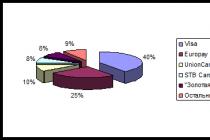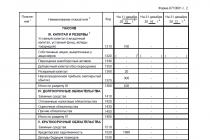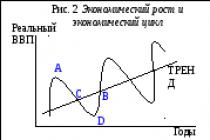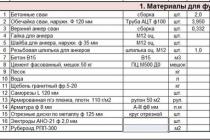Send your good work in the knowledge base is simple. Use the form below
Students, graduate students, young scientists who use the knowledge base in their studies and work will be very grateful to you.
Hosted at http://www.allbest.ru/
MINISTRY OF EDUCATION AND SCIENCE OF THE RUSSIAN FEDERATION
Federal State Budgetary Educational Institution
higher professional education
Ulyanovsk State University
Institute of Economics and Business
Chair economic analysis and government controlled
"State and municipal administration"
COURSE WORK on the topic:
"Budget federalism in the Russian Federation and regional fiscal policy"
2nd year students
Correspondence department
GMU-ZU-12/1 groups
Shamsutdinova Alsu Rafikovna
Scientific Supervisor: Doctor of Economics
Sciences, Professor Lapin Anatoly Evgenievich
Ulyanovsk
Introduction
1.1 The concept and essence of fiscal federalism
2.2 Fiscal policy of the Ulyanovsk region
2.3 Fiscal policy of the Republic of Tatarstan
Conclusion
Bibliography
Introduction
Life in a rapidly changing world leaves its mark on the processes taking place in various fields activities. In this regard, finding the right solutions, adequate to the prevailing conditions, is becoming more and more difficult, requiring integrated approach taking into account a variety of factors and high level professionalism.
These General requirements are especially important for the budgetary sphere of activity, in which radical transformations have taken place in recent years. Radically changed the entire system of budgetary relations in our country. It is no coincidence that professional budget terminology has undergone significant changes in recent years, following new phenomena in the practice of budget work.
The urgency of the problem of the formation of new federal relations in Russia is greatly enhanced by the peculiarity of the modern political process in Russia, namely, a significant increase in the role of regions in the sphere of political decision-making at the national level. With the weakening of rigid centralization and the growth of tendencies towards autarky and direct economic exchanges between regions, the role of regional administrative and economic elites has sharply increased. The course of reforms, both politically and economic sphere significantly moved from the federal level to the level of subjects of the Russian Federation. There is an obvious tendency towards political polycentrism. The success of radical reforms in Russia is due to a large extent to the construction of a well-functioning, effectively functioning federal system. Much depends on whether the center will be able to establish such relations with the regions and their political elites, in which the interests of the latter would be taken into account to the maximum while maintaining the political, economic and military unity of the country.
In this regard, it would be expedient to address the questions of the methodology of relations between the center and the regions under the conditions of federalism in Russia. And for this it is necessary first to consider this method of political-territorial organization of society and, in particular, the features of its construction in Russia.
The system of interbudgetary relations that has developed in Russia, despite the reforms carried out in the 1990s, does not meet the fundamental principles of budgetary federalism. From creating an optimal mechanism for interbudgetary relations, ensuring a real (and not just regulated by law) combination of interests at all levels budget system The success of economic stabilization in the country largely depends on the achievement of genuine financial equality of all authorities. As world experience shows, the creation of such a mechanism is an extremely difficult task. In this regard, it is impossible not to note also the economic and financial contradictions between the Federal Center and the subjects of the Federation, as well as within the latter - between the bodies local government(LSG) and state authorities of the subjects, the severity of which is not decreasing, despite the relevant legislative acts adopted in recent years.
In terms of the level of decentralization of budgetary resources, Russia is practically not inferior to most federal states, however, formally retains an extremely high, even by the standards of unitary states, centralization of taxation. budgetary powers. The budgets of the constituent entities of the Russian Federation and especially local budgets (hereinafter referred to as regional and local budgets or territorial budgets) are overburdened with obligations imposed on them by federal law without providing funding sources (“unfunded federal mandates”). The main part of the expenses of regional and local budgets, including wages public sector, as well as funding the network budget institutions governed by centrally established rules. Over 80 percent tax revenue these budgets is formed by deductions from federal taxes. The dependence of regional and local budgets on annually set proportions (standards) for splitting federal taxes undermines the incentives to carry out structural reforms, attract investment, develop the tax potential of the territories and increase tax collection. Despite the tendency to formalize the distribution financial assistance, a significant part of it is still distributed without clear criteria and procedures, which requires further development and legislative consolidation of the budget equalization methodology.
The formation of an effective mechanism of interbudgetary relations essentially depends on success in improving the efficiency of all social production, from strengthening and expanding tax base, from growth in tax revenues and an increase in the share own income budgets at all levels.
Intergovernmental relations play important role in the budgetary system of any state that has an administrative-territorial division. In Russia, with its vast territory and significant differentiation of the economic potentials of the regions, the topic of interbudgetary relations has always raised many questions and problems.
The extremely limited fiscal powers of the authorities of the constituent entities of the Russian Federation and local self-government bodies established by federal legislation make it possible to shift political and financial responsibility for balancing territorial budgets and the state of the social sphere to the federal center.
The contradictions between the decentralization of budgetary resources, the formal centralization of fiscal powers are exacerbated by instability macroeconomic conditions, the weakness of democratic institutions, the underdevelopment of capital markets and the low mobility of factors of production, inflated social expectations and demands on the state, sharp differences in budget security subjects of the Russian Federation and municipalities.
Regional and local budgets remain insufficiently transparent, there is no coherent system for monitoring the state and quality of public and municipal finance(public finance), the results of which would be available not only to authorities at different levels, but also to the population, investors and creditors.
A serious obstacle to the development of the budgetary system has become the uncertainty of the budgetary status of municipalities and existing system administrative-territorial division of subjects of the Russian Federation. The current organization of local self-government, the incompleteness of the process of its formation, the shortcomings of the inherited system of administrative-territorial structure do not allow for a full-fledged reform covering all levels of the budget system, guaranteeing financial independence and responsibility of municipalities.
All this leads to inefficient use of budgetary resources, reduction in the volume and quality of budgetary services, undermining the prerequisites for sustainable economic growth, complicating the conditions for carrying out structural reforms, distorting the conditions for equal competition, worsening the business and investment climate, further strengthening interregional imbalances, and growing social and political tension.
At present, the problem of interbudgetary relations and, consequently, the approaches used to establish the composition and size, fixed and regulating the income of the constituent entities of the Russian Federation, remains unresolved to this day. As before, when substantiating the draft budgets of the constituent entities of the Federation, there are disputes and discussions regarding the standards for deductions from regulatory revenues in regional budgets, the size of transfers and subsidies provided by the budgets of the higher level to the lower budgets.
This indicates that the existing system of interbudgetary relations needs to be reformed. In order to correctly determine the directions for reforming interbudgetary relations, it is necessary, first of all, to conduct an in-depth analysis of these relations.
Chapter 1: Budgetary Federalism in the Russian Federation
1.1 The concept and essence of budgetary federalism in the Russian Federation
Fiscal federalism is an integral part general concept federalism. The construction of genuine budgetary federalism is unthinkable if the main problems of federalism in the state are not resolved, since these concepts are closely interconnected, and the first directly follows and is built on the second.
The most important feature of federalism as an object of scientific research is the complex multilevel nature of the phenomenon under study. Federalism cannot be unequivocally attributed to any one particular science, it is the object of study of a number of scientific disciplines: political science, law, management theory, management, economic theory, theory of state regulation economics, regional studies. Discussions about the problems of federalism are in the focus of close attention of Russian and foreign legal scholars, philosophers, political scientists, economists, and are the subject of discussion at various seminars and conferences. And therefore it is impossible to reveal the essence of budgetary federalism based only on legal science (constitutional law, financial law), it is necessary to refer to and analyze the works of economists, political scientists.
Researchers endow federalism with the following institutional features:
The division of power between the center and the constituent parts of the state (subjects of the Federation), which, in relation to the budget, includes the distribution of both expenditure and tax revenues;
Equality in legal terms of the parts that make up the state, while the key question remains the extent of the responsibility of the central government for reducing (smoothing) territorial inequality (including financial), because it inevitably exists in any country because of the difference in territories in terms of population, natural resources, climate, location, etc.
The uniqueness of federalism as a political concept is also manifested in the fact that, on the one hand, every federal state has the same properties as a unitary state (single territory; population located on this territory; power acting throughout the state), and, with the other is that the federal state is a very complex system and "system theory" is applicable to it. And to strengthen the federal state, its integrity, two provisions are of fundamental importance: firstly, the stronger the relationship between the elements of the system, the higher the level of integrity of this system; and, secondly, no part of the whole can prevail over the whole. After the adoption of the Constitution of 1993, Russia began to have the classic attributes of the Federation with, on the one hand, federal features common to all federations and, on the other hand, distinctive features inherent only to it.
An essential role is played by the specifics of the state federal structure, based on a combination of administrative-territorial and national-territorial principles enshrined in the Constitution of the Russian Federation. characteristic feature is not only the multiplicity of subjects, but also their different status.
The Constitution of the Russian Federation, adopted in 1993, formally equalized the rights of all subjects of the Russian Federation. However, at the same time, a number of problems arose related to the factually unequal position of the constituent entities of the Russian Federation, which differ significantly in the level of socio-economic and even political development, as well as the socio-economic crisis experienced by the country at that time. To this we can also add such features of the Russian Federation as a vast territory with a resource, production potential, degree of development social infrastructure, big number nationalities and nationalities that have a long historical period of cohabitation as part of a single state with a high degree of unitarity, although in the conditions of the USSR the state was formally proclaimed federal.
Particular attention should be paid to the principle of equality in the relationship between the budgets of subjects and the federal budget, which involves the establishment of uniform standards for all subjects of the Russian Federation for deductions to their budgets from federal taxes and fees and a single procedure for paying federal taxes and fees. Agreements between the Russian Federation and a constituent entity of the Russian Federation containing norms that violate the uniform procedure for relations between the federal budget and the budgets of constituent entities of the Russian Federation and other provisions established by the RF BC, the federal law on the federal budget for the next fiscal year are invalid and not enforceable.
The essence of fiscal federalism is revealed through the following four main principles:
1. the unity of national interests and the interests of the population as the basis for balancing the interests of all three levels of government on budgetary issues;
2. Combination of the principles of centralism and decentralism in delimiting budgetary and tax powers, expenditures and revenues, distribution and redistribution of the latter to the consolidated budgets of the subjects of the Federation on an objective basis;
3. a high degree of independence of budgets and responsibility of the authorities of each level for the balance of the budget, budget security, based on the tax potential in the relevant territory, bearing in mind the provision of the tax initiative necessary for this;
4. active participation of the subjects of the Federation in the formation and implementation of fiscal policy, including interbudgetary relations.
Concretizing the stated principles, it seems appropriate to consider some points of view in order to develop a common approach in interpreting the concept of "budgetary federalism".
In world practice, the essence of budgetary federalism is defined as the regulatory and legislative establishment of budgetary rights and obligations of two equal parties - federal and regional authorities and administrations, rules for their interaction at all stages of the budgetary process, methods of partial redistribution of budgetary resources between the levels of the budgetary system.
I.V. Podporina believes that budgetary federalism is a form of budgetary organization in a federal state, which implies the real participation of all parts of the budgetary system in a single budgetary process, in equally focused on taking into account the interests of all participants in the budget process.
V.M. Rodionova believes that budgetary federalism is such an organization of budgetary relations that allows, in conditions of independence, autonomy of each budget, to organically combine the fiscal interests of the Federation represented by republican budget RF, with the interests of the constituent entities of the Russian Federation and local governments. The content of fiscal federalism includes:
A three-level system of budgetary relations and a clear delineation of functions between them;
Equality (but by no means identity) of the budgetary rights of the subjects of the Federation, which implies that they all have equal opportunities in the formation of their budgets. However, they may not realize these opportunities in the same way due to differences in the socio-economic conditions of management, territorial features, etc. That is why we should talk about equality, and not about identity, uniformity of budgetary rights;
Independence of each budget, providing a high degree of autonomy of regional and local budgets;
Preservation of the dominant position for the federal budget in the overall budgetary system of the country;
Equality of federal, regional and local interests, their close relationship on the basis of a clear delineation of revenue sources and expenditure assignments between the links of the budget system;
Transparency of interbudgetary relations based on approaches acceptable to all subjects of the Federation for determining the amount of financial assistance allocated to regions in need of it.
A more complete definition is given in the works of A.G. Igudina: “Fiscal federalism is a relationship based on a combination of the principles of centralism and decentralism between the federal authorities and the authorities of the constituent entities of the Russian Federation regarding the formation and implementation of the budgetary policy of the state, the distribution and redistribution of the latter between the federal budget and the consolidated budgets of the constituent entities of the Russian Federation at a high degree independence of territorial budgets, based on the need for the unity of national interests and the interests of the population living in the territories of the constituent entities of the Russian Federation and their municipalities. He identifies three main components of fiscal federalism:
1. A clear delineation of powers between levels of government in terms of spending;
2. Giving the relevant levels of government sufficient fiscal rights to exercise these powers, ensuring the mobilization of the required volume financial resources;
3. Smoothing vertical (and horizontal) imbalances through a system of budget transfers in order to provide a certain standard throughout the country public services.
Led brief analysis shows that both in foreign and domestic publications, despite numerous interpretations, a sufficiently capacious and concise terminological definition of budgetary federalism has not yet been formulated. In our opinion, this is due to the "versatility" of this concept.
In the course of the analysis and theoretical understanding of various approaches to the definition of budgetary federalism, we came to the conclusion that budgetary federalism (not only Russian) can be considered in two legal aspects:
1. budgetary federalism - as a financial and legal category;
2. budgetary federalism - as one of the most important principles for building legal relations in the interaction of all levels of government and government in the region interbudgetary regulation(federal, regional, local self-government). This principle follows from another fundamental principle of construction state system Russia - the principle of federalism.
Budgetary federalism - as a financial and legal category, in our opinion, includes the following main features:
It is a form of organization of legal relations;
The subject composition of legal relations consists of: the Russian Federation, subjects of the Russian Federation and municipalities that enter into legal relations with each other through their representative and executive bodies of power and administration;
Like any other federalism, budgetary federalism is based on the principle of centralism and decentralism, and therefore its indispensable condition is a combination of national, regional and municipal interests;
Each level of the budget system should be independent;
The goal of budgetary federalism is to ensure that every person and citizen of the country is guaranteed minimum social services and a decent standard of living.
Based on the identified essential features of budgetary federalism, we will formulate its definition: budgetary federalism, as a financial and legal category, is a form of organization of legal relations arising on the basis of a combination of the principles of centralism and decentralism between the Russian Federation, the constituent entities of the Russian Federation and municipalities on the issues of formation and implementation budgetary policy and the budgetary process of the state, subject to the observance of the financial interests of the Federation, regions, municipalities, as well as the independence and autonomy of all levels of the budgetary system.
Budgetary federalism, based on the form of the budgetary structure in a federal state, implies the real participation of all parts of the budgetary system in a single budgetary process, equally focused on taking into account the interests of all participants in the budgetary process. The search for a compromise between these interests is precisely the social orientation of budgetary policy, which is implemented within the framework of budgetary federalism by methods of budgetary regulation.
The idea of budgetary federalism is to ensure the integral development of a federal state, respect for the constitutional rights and freedoms of citizens, and receive a state-guaranteed minimum of social benefits, regardless of place of residence and type of activity.
The main task of budgetary federalism is to choose the most effective model of budgetary relations in specific economic and political conditions. To do this, first of all, it is necessary to clearly distribute the expenditure functions between the levels of government, fix the sources of financing corresponding to them, and form a system for providing financial assistance to financially disadvantaged regions. Each country solves the problem of choosing a model of budgetary relations in its own way. As practice shows, no country in the world has yet managed to build such a model of budgetary federalism, in which the volume of revenue powers of the subjects of the Federation or local bodies coincided with the spending powers assigned to a given level of government.
Fiscal federalism involves:
The presence of a truly democratic, civil society. Authorities and officials must be accountable to voters;
Equality of rights of the constituent entities of the Russian Federation in their tax and budgetary relations with the Center, which means the application of uniform principles and mechanisms in delimiting the subjects of jurisdiction and powers in the tax and budgetary spheres;
Independence of budgets of different levels;
Legislative delineation of budgetary responsibility between federal, regional and municipal authorities and administration, which implies clearly assigned funding for specific areas for each budget;
Compliance of the financial resources of the authorities and management with their powers and functions, which means "vertical alignment" of budgets;
The use of unified formalized methods for distributing financial assistance to lower budgets, which means “horizontal alignment” of lower budgets (when federal levers should ensure, if possible, equal social standards for citizens of different regions of the Russian Federation);
Maximum transparency of interbudgetary relations and procedures, financial flows.
Fiscal federalism as a principle - a way of managing various levels authorities (federal, regional, local) on the distribution of revenues and expenditures, as well as the delineation of budgetary competence between the Russian Federation and its constituent entities with an indispensable combination of the interests of the state with the interests territorial entities.
1.2 Interbudgetary relations in the Russian Federation
The presence of a federal administrative-territorial structure in itself is not yet a sufficient sign of budgetary federalism.
Budgetary federalism presupposes not only greater decentralization of the budgetary system, but also greater responsibility and independence of all its links. This is reflected in the principles of interbudgetary relations.
In the Budget Code of the Russian Federation (Article 6), interbudgetary relations are defined as "interbudgetary relations - the relationship between public legal entities on the regulation of budgetary legal relations, organization and implementation of the budgetary process." Such a definition of this concept is of a very general nature, reducing these relations to budgetary legal relations and the budgetary process without affecting their very essence.
Interbudgetary relations are relations between authorities, mainly at different levels, by delimiting, on a permanent (without time limit) basis, expenditure and revenue authorities, their corresponding expenditures and, to the maximum extent possible, revenue sources, as well as interbudgetary regulation: the possible distribution of certain taxes on temporary (at least for the next financial year) the norms of deductions between budgets of different levels and the redistribution of funds from the budgets of one level of the budget system to another in various forms in order to ensure access of citizens throughout the country to receive public services in the volume and quality not lower than the minimum required level.
The need for such regulation arises mainly when the authorities of the lower territorial level, when forming budgets, for objective reasons, do not have enough funds from revenue sources, fixed on a permanent basis in whole or in part, to ensure the minimum necessary expenses in accordance with the functions assigned to them and powers.
Interbudgetary regulation is carried out, as a rule, by higher-level authorities through vertical (between different links of the budget system) and horizontal (in the context of the budgets of the same link of the budget system) equalization of the budgetary provision of territorial entities, in which it is below the minimum required level.
Interbudgetary regulation is not limited to equalizing the budgetary provision of territorial entities, where it is less than the minimum required level. Its functions also include reimbursement to the budgets of additional expenses or loss of income caused by decisions taken by authorities of another level, and possible share budgets of a higher level in the expenditures of lower budgets, meaning the stimulation of priority (the most socially significant) directions of spending the funds of these budgets from the position of higher authorities.
The essence of Art. 7 of the Budget Code of the Russian Federation on the budgetary powers of federal government bodies consists in vesting the federal center with the right to determine only “the foundations of the budget process and interbudgetary relations”, establishing “general principles for the provision and forms of interbudgetary transfers”. The legal regulation of the budget process and interbudgetary relations at different levels of the budget system according to the principle of fundamentals means that the federal center establishes general requirements (principles) on these issues, while their specification is carried out by regulatory legal acts subjects of the Russian Federation and municipalities. According to Art. 71 of the Constitution of the Russian Federation, among the budgets of different levels, the subjects of the jurisdiction of the federal center include federal budget. Therefore, the federal government authorities have the right to establish detailed legal regulation on these issues, if we strictly adhere to the requirements of budgetary federalism, exclusively in relation to the federal budget, and the state authorities of the constituent entities of the Russian Federation - in relation to the regional budget and local budgets, guided by general principles established at the federal level.
In the Russian Federation, the differentiation of types of income (on a permanent basis) between the levels of the budget system is ensured through separate and joint local taxes. And interbudgetary regulation is carried out, first of all, by deductions from regulatory taxes. But since 2006, the possibility of applying such standards as additional (differentiated) to a single percentage of taxes fixed on a permanent basis has been provided only within the constituent entities of the Russian Federation and only for income tax individuals instead of subsidies to local budgets, calculated (per capita method) on a formalized basis. Thus, in the budgetary legislation, preference is given to interbudgetary regulation through gratuitous and irrevocable transfers to the budgets of other levels in various forms. According to this legislation, they are considered as interbudgetary transfers. Such transfers also include budget loans from the federal budget to the constituent entities of the Russian Federation, provided on a reimbursable and repayable basis.
There are big differences in the proportions of income distribution (prior to their redistribution from the budgets of one level of the budget system to another) between the central budget of the state and territorial budgets.
In the Russian Federation, regional and local authorities have some rights in the field of taxation, to one degree or another independently solve the problem of budget deficit-free or reduce their deficit, before counting on financial assistance in various forms from the budget of a higher territorial level. It should be noted that according to the Tax Code of the Russian Federation, there are a number of regional and local taxes, the tax rate of which can be set by a constituent entity of the Russian Federation or a municipality, but within the limits established by federal law.
Interbudgetary relations in federal states have features that are dictated by the budget structure of the state and the degree of development of budgetary federalism. Its essence is expressed through its basic principles. These include the following:
the presence of at least three main levels of the budget system;
the unity of national interests and the interests of the population as the basis for combining the interests of all three levels of government on budgetary issues;
a combination of the principles of centralism and decentralism in the delimitation of fiscal powers, expenditures and revenues, distribution and redistribution of the latter to the budgets of different levels on an objective basis;
the leading role of the federal budget as expressing the common interests of all subjects of the federation, combined with a high degree of independence of budgets and the responsibility of authorities at each level for a balanced budget, budget security corresponding to the tax potential in a given territory, with the provision of the tax initiative necessary for this;
active participation of subjects of the federation in the formation and implementation of the fiscal policy of the state, including interbudgetary relations.
The objective basis for combining the interests of budgets of all levels is that the ultimate goal of authorities at any level should be the interests of the population.
The combination of the principles of centralism and decentralism in the conditions of budgetary federalism means that along with the trend of decentralization, characterized by the strengthening of the democratic principles of the organization and functioning of the country's budgetary system, the necessary conditions are the preservation of the unity of the state, the financial provision of common public needs as completely free for the population (public administration, defense, and some others), in contrast to such public needs, which may be partially paid. This predetermines the observance of the priority of the federal budget, which expresses the common interests of all members of the Federation.
When implementing the budgetary policy of a federal state, it is important to combine the interests of the peoples of the multinational Federation (in their national and cultural development) as a national task.
The high degree of independence of the budgets of different levels and the responsibility of the authorities for the balance of the budget, budgetary security predetermines the increase in their interest in increasing the tax potential, timely and full collection of taxes, as well as in efficient spending budget funds. Such independence of budgets is characteristic of classical budgetary federalism, since it allows for an independent fiscal policy at the regional and local levels within its competence.
The active participation of the subjects of the Federation in the formation and implementation of the fiscal policy of the state as a principle of budgetary federalism confirms the fact that budgetary federalism is not limited to interbudgetary relations, although the latter largely characterize its features.
The state of interbudgetary relations, and interbudgetary regulation in particular, is largely predetermined by the extent to which the delimitation of expenditures and revenue sources on an ongoing basis between the links of the budgetary system meets the principle of independence of budgets. Where the level of own revenues fixed on a permanent basis is low, the issue of budget independence becomes problematic.
Based on the principles of budgetary federalism, the following principles of interbudgetary relations can be defined:
a combination of interests of all participants in interbudgetary relations;
a clear legislative delineation of expenditure powers between authorities of different levels and the corresponding expenditures, as well as revenue sources (in whole or in part) between the links of the budget system;
the maximum possible differentiation on a permanent (without time limit) basis of types of income (in whole or in part) as fixed income between budgets of different levels;
reduction of subsidization and the number of subsidized budgets by optimizing counter financial flows and increasing the tax potential in the respective territories;
equality of rights in the interbudgetary relations of the subjects of the Federation with the federal center and municipalities with the authorities of the subjects of the Federation;
application in interbudgetary regulation for all subjects of the Federation, and within each of them for all municipalities of uniform methodology and criteria that take into account their individual and group characteristics; the obligation to compensate for the missing funds in case of an increase in budget expenditures or a decrease in their income, which were the result of decisions taken by authorities of another level;
inadmissibility of withdrawal or forced centralization to the budgets of another level of own revenues fixed on a permanent basis, additionally received or saved budget funds; the inadmissibility of changing the ranking of territorial entities in terms of budgetary security in comparable conditions when transferring funds to them from a higher budget in the manner of interbudgetary regulation; mutual responsibility of authorities of different levels for compliance with obligations on interbudgetary relations; the availability of reliable information on the financial security of territorial entities that need financial support from the budget of another level;
relative stability of the mechanism of interbudgetary relations adopted for implementation;
clarity (transparency) and publicity of interbudgetary relations, simplicity of calculations.
Comparison of the current mechanism of interbudgetary relations with the above principles - the requirements of budgetary federalism for its construction - makes it possible to improve the organization of these relations, as well as to ensure right choice directions for their further improvement.
The main functions of interbudgetary relations are equalizing the budgetary security of those territorial entities where it is less than the minimum required level (ensuring compliance with constitutional and other state social guarantees throughout the country), and stimulating the growth of tax potential, timely and complete collection of payments to the budget in the jurisdictional territory, and rational and efficient use of them. Both of these functions are to be implemented in combination - as a two-pronged process. Therefore, when the leveling function becomes predominant, conflicting with the stimulating function, adjustments are required to the existing mechanism of interbudgetary relations.23
Based on the foregoing, we can give the following definitions of the delimitation and distribution of income between the budgets of the budgetary system of the Russian Federation.
The differentiation of income means the legislative consolidation by the federal government bodies of the relevant types of income (in whole or in part) on an ongoing basis for the budgets of the budgetary system of the Russian Federation.
The distribution of income is the transfer by state authorities and local governments of income assigned to budgets to other budgets of the budgetary system of the Russian Federation according to deduction standards established on an ongoing basis or for the next financial year.
The differentiation of income between the budgets of the budgetary system of the Russian Federation is characterized by the following:
federal taxes and fees, as well as taxes provided for by special tax regimes are fully or partially assigned to the federal budget, the budgets of the constituent entities of the Russian Federation, the budgets of municipal districts, the budgets of urban districts and the budgets of urban and rural settlements;
regional taxes are fully assigned to the budgets of the constituent entities of the Russian Federation;
local taxes are fully assigned to the budgets of urban districts and the budgets of urban and rural settlements, on the territory of which they are levied; the budgets of municipal districts are assigned local taxes levied in inter-settlement territories;
non-tax revenues are fully or partially assigned to the federal budget, the budgets of the constituent entities of the Russian Federation, the budgets of municipal
districts, the budgets of urban districts and the budgets of urban and rural settlements.
In contrast to the delimitation of revenues between budgets, which falls within the competence of federal government bodies only, the distribution of revenues between budgets can be carried out by government bodies of both levels and local self-government bodies of municipal districts. At the same time, the standards for income assigned to budgets in the order of their differentiation are determined by the RF BC; norms for deductions on income distributed among budgets may be established by other (except for the RF Budgetary Code) acts of the budgetary legislation of the Russian Federation. For the budgets of the constituent entities of the Russian Federation and the budgets of municipalities different kind the legislation of the Russian Federation provides for both the assignment of income to them in the manner of delimitation, and the transfer of income to them to be credited to other budgets. At the same time, only the revenues assigned to it can be credited to the federal budget, and the budgets of intra-city municipalities of cities federal significance- only income transferred to them by the state authorities of the cities of Moscow and St. Petersburg. The Budget Code of the Russian Federation determines the standards for transferring to the budgets of all types of taxes provided for by the Tax Code of the Russian Federation. At the same time, uniform standards are established for the budgets of the constituent entities of the Russian Federation, uniform standards for the budgets of settlements, uniform standards for the budgets of municipal districts and uniform standards for the budgets of urban districts, assigned to the respective budgets exclusively on an ongoing basis. In turn, the transfer of income in the order of their distribution is carried out by setting standards for deductions to lower budgets from any types of taxes credited to the budgets of the constituent entities of the Russian Federation and the budgets of municipal districts. Moreover, both uniform norms for deductions for the budgets of settlements, uniform norms for the budgets of municipal districts and uniform norms for the budgets of urban districts, approved on an ongoing basis, and differentiated norms for deductions for local budgets and for the budgets of subjects of the Russian Federation, adopted for the next financial year, can be established.
1.3 Main indicators of the federal budget of the Russian Federation
budget tatarstan tax federation
Budget - a form of education and spending Money intended for financial support of the tasks and functions of the state and local self-government.
The federal budget is a list of income and expenses of the Russian Federation for the financial year.
Consolidated budget - a set of budgets of the budget system of the Russian Federation in the relevant territory (with the exception of the budgets of state off-budget funds) excluding interbudgetary transfers between these budgets
Any budget consists of 2 main parts:
Budget revenues;
Budget spending.
Budget revenues - funds received by the budget, with the exception of funds that, in accordance with this Code, are sources of financing the budget deficit. The dynamics and structure of federal budget revenues of the Russian Federation are presented in Table 1:
Table 1: Dynamics and structure of revenues of the Federal budget of the Russian Federation for 2009-2013
billion rubles
|
Source of income |
||||||
|
Income from foreign economic activity |
||||||
|
Taxes and user fees natural resources |
||||||
|
Taxes on GWS sold in the territory of the Russian Federation |
||||||
|
Taxes on goods imported into the territory of the Russian Federation |
||||||
|
Income from the use of property |
Not specified |
|||||
|
Other income |
||||||
It should be noted that federal budget revenues are part of the revenues consolidated budget. Dynamics of execution of consolidated budget revenues for 2009 - 2013 (11 months) presented in the following diagram:
billion rubles
Portal data: http://info.minfin.ru
Thus, although the federal budget revenues are the main part of the consolidated budget revenues, there are also other sources of filling the revenue side (budgets of the constituent entities of the Russian Federation, local budgets, budgets of state non-budgetary funds of the Russian Federation). In addition, there is a trend that the income of other consolidated sources is increasing (if in 2009 the total income of other sources was 6261.9 billion rubles, then in 2012 it was already 10581.4 billion rubles)
Budget expenditures - funds paid from the budget, with the exception of funds that, in accordance with this Code, are sources of financing the budget deficit. The dynamics and structure of expenditures of the federal budget of the Russian Federation is presented in Table 2:
Table 2: Dynamics and structure of expenditures of the Federal Budget of the Russian Federation for 2009-2013
billion rubles
|
Direction of spending |
||||||
|
Social politics |
Not specified |
Not specified |
||||
|
national defense |
||||||
|
National Security and Law Enforcement |
||||||
|
National economy |
||||||
|
General government spending |
||||||
|
other expenses |
||||||
|
Intergovernmental transfers |
Not specified |
Not specified |
Not specified |
|||
Portal data: http://info.minfin.ru
The expenditures of the consolidated budget of the Russian Federation are presented in the diagram:
billion rubles
Portal data: http://info.minfin.ru
From the above, we can conclude that the federal budget is the main part of the consolidated budget, which carries out expenses for the existence of the state and social security of the country's population. In addition, the federal budget allocates funds to the budgets of other levels to cover the deficit and to provide financial support for the obligations of both subjects of the Russian Federation and local governments.
Chapter 2: Regional Fiscal Policy
2.1 The concept and essence of regional fiscal policy
The finances of the subjects of the Russian Federation are a set of monetary relations between the authorities of the subjects, economic entities and local governments that arise regarding the formation, accumulation, distribution and redistribution, the use of centralized regional funds of funds, which are the budgets of the regions, to solve socio-economic problems facing the subjects of the Russian Federation.
AT general view finance includes:
1. means of the consolidated budget of the constituent entity of the Russian Federation;
2. means of the subject's own budget;
3. funds of territorial subdivisions of state non-budgetary funds located on the territory of the subject;
4. funds received from the placement on the markets of state valuable papers, the issuers of which are the government of the constituent entity of the Russian Federation;
5. funds received through the sale and purchase of state blocks of shares; state unitary enterprises, whose owners are the government of the subject of the Russian Federation and which can be transferred to trust management hired management of these enterprises;
6. part of the profit resulting from economic activity subfederal state unitary enterprises.
The finances of the subjects of the Russian Federation are based on the following principles:
1. The principle of independence in the process of forming the budget of the subject, the budgets of the territorial divisions of state non-budgetary funds. There is a regulatory framework, which is enshrined in budget code RF, laws on regional budgets of subjects of the Russian Federation.
2. The principle of budgetary federalism, which implies the delimitation of budgetary powers, subjects of jurisdiction between the three levels of the budget system of the Russian Federation, the delimitation of sources of income between the three levels, the formation of interbudgetary relations both on the basis of regulatory taxes, the shares of which are credited to the three levels of the budget system, and to on the basis of interbudgetary transfers that perform a redistributive function between the budgets of the higher and lower levels.
3. The principle of transparency and publicity, which consists in the openness and accountability of the budget process by civil society institutions, such as the media and public organizations. The principle of transparency will be that the procedure for spending funds will be open to control by government agencies and public organizations.
The finances of a constituent entity of the Russian Federation constitute the economic basis of the state power of a constituent entity along with property and property owned by state authorities of a constituent entity of the Russian Federation or owned by budgetary organizations or institutions subordinate to state authorities of a constituent entity of the Russian Federation.
The state authorities of the constituent entity of the Russian Federation have a certain amount of authority to manage the financial resources of the regional budget and the budgets of territorial divisions of state non-budgetary funds. These powers are assigned to them in the process of development and adoption. federal laws and other normative legal acts that regulate issues related to the subjects of joint jurisdiction of federal and subfederal authorities, as well as on the exclusive subjects of jurisdiction of the region. In order to further ensure the execution by regional authorities of the powers assigned to them, sources of financing for areas of activity are transferred to the regions in accordance with the adopted federal and regional laws.
Legislation on the delimitation of powers and jurisdictions should create all conditions for the formation of sources of financing for regional budgets in amounts sufficient for the execution by regional authorities of the powers delegated to them, as well as conditions for attracting foreign investment and other funds, both for the implementation of federal and regional targeted programs, and to provide financial assistance to the budgets of municipalities located on the territory of a particular subject of the Russian Federation.
This financial support can be implemented in the following main forms:
1. Budget credit - certain budgetary funds that can be provided on the basis of a separate line of the regional budget, issued for specific purposes, or on the basis of a separate loan agreement, which is concluded by the executive authorities of the subject with the legal entity or body to which the relevant funds are issued. The contract must specify the amount, the interest rate on the loan, the term, form and procedure for repayment, the purposes for which it is taken.
2. Budget subsidies - are provided to the budgets of a lower level on an untargeted gratuitous and irrevocable basis.
3. Budget subsidies - provided to budgets of a lower level on a shared basis; can be either irrevocable or reversible.
4. Budget subvention - targeted, irrevocable, gratuitous financial support.
Between the government of a constituent entity of the Russian Federation and the federal government, additional agreements on a special procedure for the delimitation of powers, which will include, in addition to them, the delimitation of objects of ownership for land, water, forest resources, which form the basis of the subject's economy; as well as the authority to manage facilities in the territory of the subject that are under federal jurisdiction.
On the basis of agreements, the state authorities of the subject can transfer ownership shares in natural resources and all sources of income from the use of natural resources, as well as a share of profit from the operation of facilities state property on the territory of the subject. These agreements are able to ensure the financial independence of the region's budget and are aimed at implementing the principle of independence.
Regional financial policy is part of the macro economic policy subject of the Russian Federation, which includes the following main areas: tax, budget, monetary, institutional, investment, social policy.
Tax regional policy will include the following activities:
Submission of proposals from the authorities of the subject to the federal authorities regarding the need to amend the legislation in order to redistribute income and optimize tax base;
Regulatory regulation of the nomenclature regional taxes, which are assigned to the state authorities of the subject, that is, these bodies can cancel or introduce regional taxes;
Revision tax rates on regional species taxes or, together with the local level, revision of local tax rates;
· Regional authorities can make proposals both at the federal and local levels regarding the expansion of the tax base, and tighten or liberalize the system of tax administration in the territory.
Activities within the framework of budgetary policy include:
· The process of formation, approval and execution of the regional budget;
Similar Documents
budget policy. The concept of the budget and the budget system and its meaning. budget and tax policy Russian Federation and directions of their reform and problems. budget deficit. Analysis of expenditure and profitable parts budget of the Stavropol Territory.
term paper, added 12/25/2008
Budgetary federalism and budgetary independence. The structure of the budget system of the Russian Federation. Differences between federal and unitary budget systems. Factors of the budget deficit. Models of construction of budgetary systems of the state. Formation of income.
presentation, added 02/15/2015
concept public finance. The system of taxes and fees of the Russian Federation. Deficit and surplus state budget. Discretionary and non-discretionary fiscal policy. Government spending multiplier, built-in stabilizers.
presentation, added 08/23/2016
The concept and features of the budget and the budget system in the Russian Federation. Budget classification and its role in the cash execution of the state budget. Budget process and fiscal policy. Budget control.
thesis, added 09/12/2006
Theoretical basis estimates financial condition the budget of the subject of the Russian Federation, its role in the development of the region. The structure of revenues and expenditures of the regional budget. Analysis of the balance and financial condition of the budget of the Republic of Tatarstan.
term paper, added 01/26/2012
The concept of a budget device and its types. Principles of budget execution, the role of taxes in the formation of revenues and expenditures, public debt management, budgetary federalism. Fundamentals of interbudgetary relations and analysis of the draft federal budget of the Russian Federation.
term paper, added 05/20/2009
The essence of the state budget of a unitary state. The budget system of the Republic of Kazakhstan, the main problems. budget system foreign countries. Analysis of the process of formation and execution of the budget. Solving the problems of fiscal policy.
thesis, added 03/30/2009
Economic content, the value of budget revenues of the constituent entities of the Russian Federation, their classification. Legal regulation formation of the revenue part of the budget. Analysis of budget revenues of the Republic of Tatarstan. Assessment of the role of interbudgetary transfers.
thesis, added 01/06/2014
Budget system, principles of its functioning. Types and models of budgetary systems, their features. The essence of the consolidated budget. Content and basic concepts of budget policy. Budgetary federalism and interbudgetary relations in the Russian Federation.
thesis, added 12/16/2011
Essence, structure and functions of the consolidated budget of the subject of the federation. Features of the Consolidated Budget of a Subject of the Russian Federation in the System of Budgetary Federalism. The main directions of improving the balance of regional budgets.
An important function of self-government in the region is the budgetary policy. The current legal framework for regulating budgetary relations, in our opinion, does not fully meet the requirements of the independence of the region. There are significant inconsistencies in economic basis tax and credit policy both at the federal and regional levels.
However, the proposals of a number of scientists to turn the budgets of the territories (up to a single settlement) into the main budgetary level, where a significant part of the region's budget revenues would be concentrated, look untenable. It is known that both regions and territories within regions are heterogeneous in terms of economic potential, some are donors, others are subsidized. And this is a consequence of objective factors. Establishing standards for the formation of the budget of individual territories only depending on the level of their national wealth would mean conservation of this heterogeneity.
The regional budgetary-tax system, as well as the federal tax policy, are now subject to the greatest criticism. The main requirement for it is a targeted regional orientation, without which it simply turns into the lower level of the state budgetary tax system. Without this it is impossible to ensure independence regional government to maintain the potential of the region at the proper level. Other requirements for the fiscal system are simplicity (accessibility for execution), clarity (validity of the principles of construction), fairness (taking into account regional and state interests).
Without going into the essence of fiscal systems various countries, note the importance of the alignment principle, i.e. redistribution of income in order to maintain individual regions. But for the regions acting as donors, this means a reduction in fiscal capacity. Taking into account the objective need to support individual (poor, depressed) regions, as well as the existing structure of the economy of regions rich in natural resources and having a higher tax potential, it is necessary to build a fiscal system on the principle of justice, especially since the incomes of wealthy regions are provided, in essence, at the expense of the entire country.
The fundamental issue in this procedure for the formation of fiscal policy is to justify the share of tax revenues, which should be centralized at all levels of government. At the federal level, this is established by law, however, individual regions are seeking preferential terms. At the regional level, the definition of a fund for budgetary appropriations requires mandatory planning of the necessary funds for carrying out regional programs, financing of all-regional objects of culture, science, health care. The rest of the region's budget (as well as the federal one) should be distributed in proportion to the population. This approach provides a more equitable distribution of budgetary funds both between regions and within them than single-channel budgeting from the bottom up or from the top down.
The main task of the regional budget policy (RBP) is to create equal competitive and socially fair conditions for all administrative-territorial units of Russia in order to expand their participation in the formation of a single market for goods and services in the country. This can be done, first of all, by increasing the share of investments in the fixed capital of the processing industries in the budget expenditures, which in turn will affect the development domestic market and, accordingly, domestic consumption.
The selection of this task as the main one is connected with the solution of the strategic goal - reducing the level of the country's dependence on the sale of energy resources, which can only be achieved by moving away from the raw material orientation of the national economy, diversifying it. This goal is quite achievable, taking into account the still rather high intellectual potential of Russians and the skills of the country's powerful engineering corps that have not been completely wasted until recently.
The current state of the budget, the surplus of which is mainly associated with the growth of world energy prices, is a well-founded alarm not only among economists, but also, as they say, among "the general population." According to the widely known opinion of the World Bank (WB) experts, the dependence of our entire economy on the fuel and energy complex is much higher than officially recorded statistics. Thus, according to the State Statistics Committee, the oil and gas industry provides 9% of the total GDP, and according to expert estimates of WB specialists, 25%. Of course, one can dispute these data, but the above task of diversifying the economy is undeniable.
Receipts from the raw materials sector will remain the main revenue item in the budget for a long time to come. In this regard, the widely discussed problem of the withdrawal of excess profits (natural rent) from oilmen deserves special consideration. Without going into the complex issues of ways and methods of extracting natural rent, we emphasize that the largest oil companies countries earn about 70 billion dollars a year, that is, windfall profits are evident. However, they should be withdrawn in such a way as not to undermine the incentives for self-development among oilmen and thus put budget revenues themselves in a risky situation. One thing is certain - additional budget revenues will be received and used appropriately, in particular, to reduce the dependence of the budget on the same fuel and energy complex.
The second component of the RBP is the orientation towards achieving a balance between sectoral and territorial development.
It should be noted that inter-budgetary relations, the adoption of the law on which has been unreasonably delayed, should be closely linked to the tax system. It is also necessary as soon as possible to eliminate the imbalance in the budgets of the regions, associated, among other things, with their losses as a result of a number of well-known measures in the framework of the tax reform. Moreover, it is advisable to compensate for the reduced budget revenues of the regions not only through direct subsidies, but also through loans, especially since there is now enough money in the “treasury”.
Redistribution mechanism budget revenues between the federal center and the regions as a whole belongs to the sphere of state regional policy, which will be determined, among other things, within the framework of administrative reform, in terms of the distribution of powers between levels of government. Moreover, the daunting task of distributing financial resources is being solved in conditions of a colossal difference in the financial condition of the regions. Along with the regions transferring 60-65% of their income to the federal budget, there are regions that cover most of their expenses from the federal budget. The federal center (Moscow) stands apart, in which up to 80% of the capital of the entire country is concentrated. That is, one of the main goals of regional policy is to find the optimal balance of federal and regional interests. One of the most important tasks of the RBP is to stimulate the use of local natural and economic resources, which will, firstly, reduce the dependence of regions on federal subsidies, and secondly, increase revenues to the federal budget. That is, the RBP should be guided by a rather simple, but often difficult to understand idea: “The more we give, the more we receive.”
The mechanism for the redistribution of financial resources can be built taking into account territorial rent, if, of course, it can be reasonably formalized so as not to fall into the vicious principle of taking from the rich and giving to the poor (in this case, we mean regions). So far, the only clear solution to reduce the number of depressed regions is to join them to the successful ones, while observing democratic principles, that is, through referendums. This process, as is known, has already begun (the Perm region and the Komi-Permyatsk district are united) and, apparently, will continue.
The third major task of the BPO is to promote competitiveness and investment attractiveness Russian regions, and the last task should be solved taking into account the changing geopolitical situation.
– overcoming poverty through the development of a competitive economy;
– development of health care based on the improvement of the system health insurance, creation of competition in the market of medical services;
- improving the quality of education and achieving a balance in the training of specialists with the national economic needs for them;
- maintaining the normal state of housing, liquidating its dilapidated part and increasing the volume of construction on the basis of long-term lease, mortgage lending and other progressive forms;
– modernization of transport, electric power and housing and communal services;
– share growth budget spending on science, especially areas that determine scientific and technological progress.
An important factor in solving these and other socio-economic problems is the close relationship between tax and budget policy, which makes it possible, in particular, to compensate for shortfalls in regional and local budget revenues and to make additional investments for structural and other reforms. At the same time, the main task remains to expand the taxable base and increase the degree of tax collection.
With regard to the 2004 budget, first of all, it should be noted as a positive fact that it was adopted at the end of the reporting year, and not at the beginning of the current one, as happened in the last five years. The budget has been drawn up in a very professional manner, which is primarily evidenced by its good balance, despite the fact that it is planned to reduce the overall tax burden by 1% of GDP.
However, in the opinion of many experts, this budget is not a development budget, since it actually conserves the current socio-economic situation and is drawn up according to the principle “from what has been achieved” that has set the teeth on edge back in Soviet times. Thus, in 2004 GDP growth is envisaged by only 5.2%, while for its declared doubling by 2010, the average annual rate should be no less than 8%. An integral indicator of the success of the budgetary, as well as general socio-economic, policy is, in our, perhaps unconventional, view, the increase in the life expectancy of Russians. It is characteristic that Last year, when the population of Russia reproduced itself, this is a turning point in many respects in 1991. So that's when demographic situation will finally begin to improve, mainly due to a decrease in the death rate, since one cannot count on a radical increase in the birth rate - this will indicate the end of the period of instability and the beginning of a qualitative increase in the standard of living of the population. Related to the above-mentioned other integral indicator is the convergence of the level of per capita incomes of 10% of the most and least well-to-do citizens of the country. While this ratio is respectively 30 and 2% of the total cash income population. This seems to be a certain scope for the activities, first of all, of the tax authorities.
And finally, let's decipher the title of the theses. All authorities in their activities should be guided by the main national idea of all peoples - the desire for a better life in their native land.
Regional fiscal policy is a separate part of the state budget and tax system, including regional budgets, regional taxes, fees, benefits, subsidies and subventions, as well as regional financial and tax relations with the "center" and, more rarely, with other territorial levels.
The following terms are used in the legislation of the Russian Federation:
- - subsidies - funds provided to the budget of another level of the budget system of the Russian Federation on a gratuitous and irrevocable basis to cover current expenses;
- - subventions - funds provided to the budget of another level of the budget system of the Russian Federation or legal entity on a gratuitous and irrevocable basis for the implementation of certain targeted expenses;
- - subsidies - funds provided to the budget of another level of the budget system of the Russian Federation, to an individual or legal entity on the terms of shared financing of targeted expenses.
The budget and tax systems of the regions of the Russian Federation accumulate about half of all budget and tax flows of the state, with very noticeable fluctuations in terms of expenditures and revenues.
In terms of elemental composition, regional budgetary and tax systems are similar to national ones, differing only in relations. For example: taxes and fees, subsidies and subventions are present in both cases, but the state appoints and establishes them, while the regions, with varying degrees of freedom, accept them for execution and use. Regional fiscal systems consist of several regional subsystems of different levels, with a hierarchical construction of the territorial organization of the state (for example: if locality is part of a district, a district is an oblast, etc.) between these subsystems, budgetary and tax relations arise, in many respects similar to relations of the "state-region" type.
Regional fiscal systems are being created and reformed to perform several interrelated functions, among which are the following:
- 1. Fixing a certain procedure for the movement of budgetary and tax flows, according to the levels of the territorial organization of the state (the direction of these flows, the proportions of their division, the intended purpose, etc.) and adequate procedures for regulating the relations that arise on this occasion.
- 2. Accumulation and use for general regional purposes of funds generated in the territory itself and entering the regional budgetary and tax systems completely and single-channel (this is the majority of local taxes, fines and other financial sanctions), similarly generated funds entering these systems partially, in accordance with the accepted order of their distribution between the budgetary-tax systems of different levels (for example, "oil money"). Part of the funds accumulated in the higher budgetary-tax system is redistributed for one reason or another in favor of the lower regional systems (grants and subventions, as well as part of the "local funds" that were not transferred to them by permission of the higher systems).
- 3. The implementation by regional authorities and management of their representative and executive powers in compliance with the requirements of formal financial independence their policies from higher levels.
- 4. Self-support of intra-regional social programs, i.e. budgetary satisfaction of a part of the needs of the population in certain vital goods and the realization of its national and ethnic interests. Despite the increasing self-sufficiency of the population and the commercialization of the social sphere, the share of the cost of relevant services financed through the channels of regional budgetary and tax systems reaches a quarter of the total income of the Russian population (net of taxes).
- 5. Formation of the infrastructural frame of the territory (industries of the "local economy", local roads and transport, etc.) as the most important initial condition for the formation and maintenance of intra-regional ties.
- 6. Regulation of the state and use of natural resource and ecological potential (land, subsoil, forests, water, flora and fauna, air basin) as a natural basis for the existence and development of the territory.
- 7. Stimulation of certain value regional reference points of the population, creation of conditions for its business activity, for structural transformation, for investment attractiveness, etc. This is a question not only of the potential for territorial development, but also of future fiscal well-being.
The main requirement for the fiscal system is the requirement of a target regional orientation systems under consideration, without which they turn into the lower level of the totalitarian-state budgetary-tax economy.
One of the essential directions of Russian reforms, launched in 1993, is decentralization in the sphere of domestic financial relations. The formation of a budgetary union of the Federation (its subjects and administrative-territorial units) based on qualitatively new principles began.
First of all, we are talking about the fact that the budgetary-tax relations of the "center" and the regions have increasingly become determined by law and additionally regulated in the mode of dialogue. The responsibility of regional authorities and administration for the direction of spending financial resources is noticeably increasing (especially in social sphere), guaranteed new budgetary rights these bodies, and there are new sources of revenue for regional budgets.
The problem of the relationship between different levels of budgetary and tax systems has in the conditions Russian economy two aspects. On the one hand, the relationship between the federal budget and the budgets of the subjects of the Federation is considered. On the other hand, - financial relations between the government bodies of the Federation and local self-government structures.
In the general case, the organization in Russia of financial relations between the budgetary and tax systems of various levels requires the solution of three interrelated issues.
- 1 - according to what principles the responsibility for the implementation of the corresponding expenditures should be distributed among different levels of government and administration.
- 2 - how it is necessary to distribute the sources of income to cover these costs.
- 3 - due to the fact that expenditure items of budgets and financial receipts usually do not coincide in volume.
Traditionally, there are three main approaches to solving the problem of budget sharing. The first of these involves the introduction of differences in categories of taxes. At each of the three levels (Federation, regions, local authorities), while collecting its own base taxes. Such a scheme of income distribution minimizes redistributive processes in the budgetary-tax system, forms stable and quite understandable "rules of the game" between the subjects of the Federation and the center. At the same time, this scheme can be effectively implemented only if the regions are relatively homogeneous in fiscal terms. Meanwhile, in Russia the regions are heterogeneous in this respect.
The second approach is to separate income and taxes. Within the framework of the fiscal system, interest rates are fixed, in accordance with which revenues for certain types of taxes are distributed among federal bodies and territories.
At the same time, the option of combining rates is also possible: at the federal level, its own rate is introduced, at the regional level - its own. This approach opens up wide opportunities for increasing the scale of the redistribution of budgetary resources. This encourages the regions to exert as much pressure as possible on the center in order to obtain fiscal incentives by differentiating the respective contribution rates. It is clear that the success of one region here serves as an incentive for even greater activation of others. The result is a sharp increase in individually regional regulation of budgetary relations.
Under pressure from regional elites, the system of unified federal taxes is gradually being destroyed and ceases to function as an integrating factor within the Federation. The budget-tax system acquires a contractual-regional character. For all that, it should be noted that, in principle, the implementation of the second approach makes it possible to take into account the specifics of Russian regions to the maximum.
The third fundamental approach to the division of budgets between federal bodies and territories involves determining the percentage of payments to the federal budget from the total amount of taxes actually collected in the region. However, it is often not specified whether each territory will introduce its own system of taxes, or whether it will use as a basis single system coordinated between the regions at the federal level. Therefore, when implementing this approach, it is precisely the danger of maximum decentralization of the federal budget with a simultaneous strengthening of redistribution processes and centralization of budgetary funds at the regional level that appears.
The very possibility of determining the interest rate of deductions to the federal budget agreed with the regions is also very problematic. Exporting regions will, of course, insist on its reduction. Relatively resource-poor regions, characterized by a low level of fiscal security, are interested in higher interest rates deductions in order to maintain and replenish the budgetary resources of regional equalization, from which the needy subjects of the Federation receive very tangible support.
An important function of self-government in the region is the budget policy - the direction of the activities of public authorities for the preparation and execution financial plans of the country and administrative-territorial formations that are in self-government.














